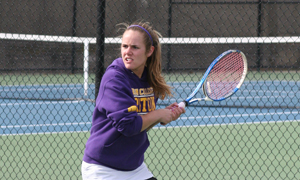Stories on this page demonstrate examples of how student-athletes in the MIAA they show respect and fairness toward opponents, officials, and others in the competitive arena.
![]()
 Young tennis players have not always grown up with good role
models as far as sportsmanship is concerned. Athletes on the
professional circuit – it seems – have made as many
headlines for abusing a referee or a racquet as they have for their
championship caliber play.
Young tennis players have not always grown up with good role
models as far as sportsmanship is concerned. Athletes on the
professional circuit – it seems – have made as many
headlines for abusing a referee or a racquet as they have for their
championship caliber play.
Albion College senior Sarah Towler was sheltered from scenes of bad sportsmanship because tennis was not her No. 1 sport growing up. The Milan product who was selected for the MIAA's Sue Little Sportsmanship Award by her peers at the end of the 2011 league season played more competitive soccer because she didn’t enter youth events sponsored by the United States Tennis Association and her high school didn’t sponsor a tennis team until her senior year.
"I played tennis for fun at the country club growing up and I did a few lessons in the summer – just a few times a week," Towler recalled of her participation in tennis as a youth. "Not having a team in high school has made me appreciate tennis more."
That’s not to say Towler is milquetoast on the court. In a sport where the players determine if the ball lands in play Towler is clear she stands her ground, but she calls the lines in a respectful manner.
"If I’m nice to my opponent, it helps in the long run," Towler said. "I like people to look at me as nice on the court, but as a good competitor."
Click here to read more about Sarah Towler
![]()

March 2012
Sportsmanship decisions confront athletes in a variety of playing circumstances. Doing the 'right thing' can often be the challenge.
"I have seen this happen many times during my career," says longtime Hope College men's golf coach Bob Ebels in relating a personal experience at the NCAA Division III national championships.
"Our young golfer called a penalty on himself for hitting the wrong make of golf ball (a pro.V and not a pro.VX). This was done without his playing competitor knowing that he hit the wrong ball. It led to a DQ at the national tournament."
Senior Nick Campbell of Saline, Mich. was the Hope golfer faced with the toughest decision of his career, but he didn't hesitate for one moment: "Golf is certainly a unique sport in that the players are expected to adhere to a certain code of etiquette that surrounds the game," he says. "Growing up as a young player, I was taught the rules and how to conduct myself on the course just as frequently as I was taught the fundamentals of the swing. I learned of players that enforced the rules upon themselves and were celebrated for their honesty, because the golf community is proud of its reputation as a game where maintaining one's honor is held equally as high as winning.
"The NCAA Tournament incident, in my mind, was just a reflection of everyone who had influenced me growing up in and around competitive golf. I don't think my parents or coaches were surprised when they heard what had happened, because they were the ones who always stressed the concept of playing with integrity. Integrity is worthless if it only shows up when people are watching. I'll tell you what though, that doesn't make it any easier when you have to sit the rest of the day out and know that you might have hurt your team."
Nick Campbell's action at nationals left a lasting impression on his teammate, senior Andy Thomson of Beaver Dam, Wis. who has himself been honored for sportsmanship.
"I can’t think of any better example of honesty and integrity in our game than in Nick's decision to call a penalty on himself at the NCAA Championships," said Thomson, who was voted by his peers to receive the MIAA's 2011 golf Sportsmanship Award. "If Nick hadn’t called the penalty on himself, no one would have ever known that he broke a rule...except Nick. For calling the penalty on himself, he was disqualified from the first round of play, but he successfully upheld the integrity of our game, and that is true sportsmanship."
Coach Ebels believes that such decisions follow naturally from a commitment to doing the "right things," a habit that coaches -- whatever the sport -- play a major role in developing.
"We coaches set the bar -- how we treat other coaches; how we talk and handle ourselves; how we respect the rules of golf; how we treat and respect golfers from other schools. Our student-athletes are watching and they will model the values we've demonstrated when it’s their turn to lead."
![]()

November 2011
On Wednesday, October 26, there was more than the average amount of purple on the field at the Saint Mary's-Albion women's soccer game at the Belles' home field.
To the casual observer, it would have appeared that two teams with purple were squaring off on a neutral site. However, the Saint Mary’s soccer team was donning purple t-shirts during their pregame warm up to help raise awareness for domestic violence.
According to national statistics cited by the Saint Mary’s Belles Against Violence Office (BAVO), one in every four women will experience relationship violence in her lifetime while 16-24 year old women are consistently reported as the group most at risk of relationship abuse.
Senior midfielder Taylor Paton is a student advisor for BAVO and helped the office collaborate with the soccer team and the Student Activities Board to recognize Domestic Violence Awareness Month in October.
"I wanted to pair BAVO and the soccer team together to create a deeper awareness of domestic violence for my teammates as well as for the student body," said Paton.
Connie Adams '08, Assistant Director for BAVO, added, "A Domestic Violence Awareness Month soccer game demonstrates the awareness and commitment of Saint Mary's to address this issue and to empower individuals to stand in solidarity."
An important aspect of the game beside the competition itself was the chance to instill a sense of fellowship among the two teams for an important cause. That essence of fellowship is one of the ways that sportsmanship is defined and practiced in an otherwise ordinary way.
"Sportsmanship is something I value as a person, but especially as an athlete," Paton said. "As our team came together to play for this cause, we created an unspoken unity with the other team by wearing their colors. [Purple] is the designated Domestic Violence Awareness Month color; I think it made them feel more at home."
Read more about Saint Mary's and its campaign against domestic violence here
![]()
October 2011
Out of the eight MIAA men’s golf Jamborees that took place this season, Marty Predmesky made the top 10 six times. His lowest round this year is a cool 72, which he has achieved twice. Predmesky has also medaled twice and is a vital part of this the Alma men’s golf team. All of these things are achieved with a great deal of sportsmanship.
The gentleman’s game of golf holds players to a high standard – arguably higher than most other sports. Golf demands honesty – every stroke counts and must be counted. Golf doesn’t allow for sore losers – at the end of a round, win or lose, a player congratulates his opponent. Sometimes the hardest thing to do in sports is to look the man in the eye that has just beaten you, but in golf, it’s the norm. Golf requires integrity – there are no officials or referees. It’s just the golfer and his or her conscience.
Predmesky emits all of these qualities through his success in golf. Admittedly, these attributes are pretty unique to the sport. Basketball players or soccer players don’t apologize to their opponents or the officials when they commit a foul. It’s just different in golf, almost like the players are a different breed.
With the 2011 season drawing to an end, this is only the beginning for first-year golfer, Marty Predmesky. He has three years remaining to show Alma College, the MIAA and the NCAA what honesty and integrity look like. In the next three years, Predmesky will have set a high bar for what it means to have true sportsmanship.
![]()

September 2011
Tennis is one of only a handful of sports that has sportsmanship written directly into the rules of the game. This list of ethical rules of behavior is called “The Code”. No other sport requires the competitor to give a point that he/she has won back to an opponent because the player recognized that there has been a mistake in judgment. That is the essence of true character and sportsmanship.
Hope College men's tennis coach Steve Gorno has had the good fortune to coach 11 MIAA Sportsmanship Award winners over the last 19 seasons. During that same time, he has coached dozens of other student-athletes that were equally deserving of winning this award.
"As a coach, I am tremendously proud and eternally grateful for each one of my players who has lived their lives so well to allow me to be able to say that," Gorno says.
"Our team believes in 'The Code.' We believe that character and integrity are as much a part of the game as the competition itself. To help us live up to our own high expectations, we have certain guiding principles that govern how we behave, how we manage our emotions, and how we treat others -- not just while we are on the court competing, but whenever we are out in the public eye. The most important of these guiding principles is simple - Always treat others with respect. It is the foundation upon which every other guiding principle is built. We talk about these guiding principles frequently and we hold ourselves and each other accountable for not just following, but truly living out these principles in our every day lives. This includes the players holding the coach accountable to living up to the same standards of behavior. None of us are perfect. But we believe that if we work together, we can get a little closer to perfection."
Read more about Steve Gorno here
![]()
May 2011
 Typically colored only in orange and black, Kalamazoo
College’s Anderson Athletic Center turned pink for a special
event on October 22, 2010.
Typically colored only in orange and black, Kalamazoo
College’s Anderson Athletic Center turned pink for a special
event on October 22, 2010.
The Kalamazoo College and Saint Mary's College volleyball teams joined together to raise money and awareness for breast cancer research, hosting a Dig Pink Rally. The Hornets participate in more than one of these games every season in addition to hosting their own.
Not only does this event raise money for breast cancer research, it also promotes sportsmanship between teams, which is more than just fair play.
"There is a different energy at the Dig Pink games because there is a different reason for playing," Kalamazoo head coach Jeanne Hess said. "It’s not just about competition or winning, it’s about being a part of something larger than yourself.
"In any game, we welcome the other team to our facility and we are glad they are here," said Coach Hess, "But for the Dig Pink games, we also work with the other team prior to the game to plan the event.
"When we play in one of these games, I always tell the girls to play as if they were fighting breast cancer. The teams are not simply competing with one another, they are contributing to the fight against cancer."
The games mean something to both teams, and all of the money raised in the MIAA goes to the Side-Out Foundation, which uses the money for research, support programs for patients, and teaches volleyball players about helping those in need, and also assists teams in distributing educational material in their area.
Click here to read more about the Dig Pink event
![]()

April 2011
It was easily the highlight of his college career. Trine wrestler Alex Fleet was in the NCAA’s Division III national championship and ready to a fitting final chapter to an outstanding career.
After four years of success, the 197-pound wrestler from Lowell, Mich. was face-to-face with a chance to attain one last personal goal – earning all-American status. Once at the tournament, he faced the top-ranked wrestler in a first-round match and wrestled another top-five wrestler in the consolation round and exited the tournament 0-2.
Disappointing? Sure, but Fleet wasn’t about to sit on the sidelines and pout.
"It would have been real easy to sit back and feel sorry for himself, but that’s not Alex’s style," Trine wrestling Coach Dan Callahan said. "He is a caring, giving person. Rather than wallow in his loss, he stepped up and helped."
Fleet turned his attention to teammate Elias Larson who was also participating in the championship in the 157-pound class.
Fleet served as Larson’s warm-up partner and kept his focus on his goals for the remainder of the tournament. It helped create a routine that helped him perform at his potential.
Larson claimed a third place finish and was Trine’s first-ever All-American wrestler.
Callahan made it clear. "Having Alex involved Eli achieve All-American status."
![]()

March 2011
Win at all costs, right? If you don’t win, you aren’t a success, right?
Don’t think so.
Alma College senior women’s basketball player Sydney Beckwith (Weidman, Mich./Beal City) completed her collegiate career on Feburary 19, when the Scots defeated league opponent Olivet College by a margin of 61-57 on Senior Day at Art Smith Arena.
The bitter irony of the day was that Beckwith, in her last game, suffered a serious knee injury that ended her afternoon. She had scored eight points in the first nine minutes of the contest, giving the Scots the momentum to keep going. Then, from the bench with a knee brace, Beckwith cheered the team to the victory.
"I wanted to go out on a good note and have fun doing so, and I gave it my all until the end," said Beckwith. "It was tough being hurt in the last game, but my teammates wouldn’t let us lose."
Beckwith is a two-time All-MIAA second team selection and finished third in the MIAA in scoring this season at 14.6 points per game. She is a top 10 all-time scoring leader for the Scots, but yet her team won just 20 league games during her career. But that does not drag her down, and her smile on the court illustrates what Division III athletics is about.
"I have been around sports for over 20 years, and I honestly have never met anyone with Sydney’s pure love for the game," said Alma Sports Information Director Mike Hanson. "Her on-court smile and desire is genuine and her respect for opponents and officials is something all of our athletes should emulate."
![]()

February 2011
The Olivet College men’s basketball team hosted Hope College Saturday, Jan. 15, at The Cutler Event Center. The Flying Dutchmen may have won the intense battle on the court, 77-71, but there was plenty of sportsmanship exhibited by the Olivet community before, during and after the game.
First when Hope’s cheerleaders arrived at the gym for the game, they were greeted by Olivet’s game administrator, Hans Morgan, who showed them where they could warm up as well as arrange where they would cheer during the game. Another Olivet staff member even took time to show the cheerleaders where the restrooms were rather than pointing them in the right direction.
The sportsmanship continued during the game, as Mindy Otto, Olivet’s cheerleading coach, was very welcoming and cooperative in sharing the space on the sideline and on the court during timeouts with a rival school. According to Wes Wooley, Hope’s cheerleading coach, “She (Mindy) and her squad made us feel welcome and seemed appreciative to have cheerleading counterparts at the game.”
However, the most extraordinary example of sportsmanship by the Olivet community did not occur until several hours after the game ended. Upon returning to Holland, Wooley received a call from Hope’s public safety officer that Pat Jennings, father of Olivet player Nathan Jennings, found a large carrying case containing the signs used by the Hope cheerleaders in the parking lot when he was leaving.
Click here to read more about Olivet's sportsmanship
![]()

January 2011
Golf is a sport that is considered a gentleman's game, despite what you see professional golfers doing on television by slamming clubs. Adrian College senior Jordan Kelly prefers to leave the antics to the pros. Kelly exemplifies what the word sportsmanship means.
A local product, Kelly attended Adrian High School before moving on to Adrian College where he has been one of the Bulldogs top golfers during his four seasons. At the conclusion of the 2010 golf season, Kelly was rewarded by being honored with the MIAA Sportsmanship Award.
"It was an honor to have received the sportsmanship award because it speaks volumes to my parents and family who raised me," Kelly stated. "Being awarded the MIAA sportsmanship award is the most meaningful award I've received in my life. It means so much because it speaks about someone's character. Good character requires a positive attitude even in times of turmoil. It also includes respect being shown to everyone else and that's one of the things that I pride myself on doing, being positive and being respectful. I'm just incredibly thankful and blessed to be acknowledged by my peers and coaches around the conference."
This past season Kelly tied the MIAA record for lowest 18-hole score with a 65. Instead of celebrating in grand fashion, Kelly was overwhelmed with people congratulating him on an outstanding feat.
"You always know what you are getting from Jordan," Head Coach Troy Martin stated. "He is friendly to competitors, coaches and spectators. He is a great role model for our younger players on how to carry yourself on the course. His personality on and off the course is great. Other players in the conference would constantly request to play with him during jamborees."
Click here to read more about Jordan Kelly
![]()
December 2010
 The Calvin and Hope men’s and women’s cross
country teams reaped a wealth of success during the 2010 with the
Calvin men’s and women’s teams and the Hope
women’s team advancing to the NCAA Division III championships
while Nathan Love of the Hope men’s team also advanced to the
national meet as an individual. Prior to the 2010 season, both
teams gathered together in a theme of fun and sportmanship to renew
a tradition that dates back more than 90 years.
The Calvin and Hope men’s and women’s cross
country teams reaped a wealth of success during the 2010 with the
Calvin men’s and women’s teams and the Hope
women’s team advancing to the NCAA Division III championships
while Nathan Love of the Hope men’s team also advanced to the
national meet as an individual. Prior to the 2010 season, both
teams gathered together in a theme of fun and sportmanship to renew
a tradition that dates back more than 90 years.
The “Rivalry Relay” between the two schools consisted of an almost 36-mile relay divided into seven legs. The race began at John Ball Park in Grand Rapids and ended at Tunnel Park in Holland. The first six legs were five miles each, with the anchor leg finishing the final 5.85 miles.
Hope junior Nate Love and Calvin senior Alex Wrobel teamed up to organize the event and plan the course. Along with Calvin senior Jake Christiansen and junior Martin Avila, Wrobel took Friday night to mark the course and hand-off points.
Entirely student organized without any aid of coaching staffs from either school, the relay displayed the genuine spontaneity, camaraderie, and endurance between the two squads. Even a few wrong turns couldn’t stop the teams from finishing strong and enjoying each other’s company. The off-season setting provided the runners with an opportunity to get to know each other beyond competition.
Click here to read more about the Rivalry Relay
![]()

November 2010
Golf is a sport that is meant to be played with integrity and honesty while maintaining the etiquette that goes hand in hand with teeing up the ball on the first hole. Saint Mary’s senior and Oak Lawn, Ill., native Mary Kate Boyce is one golfer who continually does her best to uphold the traditions that have made golf the sport it is.
Earlier this fall, Boyce was competing at one of the four MIAA Jamborees and was in the hunt not only for a team conference title, but also for the individual season medalist crown.
During the course of the round of play while assessing her next shot, the senior was clearing debris from around her ball. While all golfers are extremely cautious in performing such a task, accidents do happen. The action inadvertently caused the ball to move and the senior was the only person around to see the incident.
In her mind, there was no gray area and no hesitation - she already assessed a penalty on herself in that millisecond.
Click here to read more about Mary Kate Boyce
![]()
October 2010

As one of the starting defensive ends for the Albion College football team, Jeremy Green (#99) is literally fighting each play to throw the opponent’s ball carrier for a loss. While the football landscape is littered with linemen who bring attention to themselves after making the big play, Green maintains his background helped him forge a positive attitude of respect for his rivals on the field.
Growing up in Chattanooga, Tenn., Jeremy and his brother Charles, ’10, an all-MIAA lineman for the Britons in 2009, were reared by parents who didn’t have the opportunity to participate in sports because they were always working. While sports provided the competitive outlet for Jeremy and Charles to determine who was best, Jeremy has honed the attribute of sportsmanship by developing a love for the game rooted in the knowledge he is enjoying an opportunity that could have easily passed him by.
Click here to read more about Jeremy Green
![]()
September 2010
 Hope College senior tennis player Katherine Garcia of Battle
Creek, Mich. grew up with the idea that respect for the game and
regard for its players is of the highest importance, more so than
even the outcome of any match.
Hope College senior tennis player Katherine Garcia of Battle
Creek, Mich. grew up with the idea that respect for the game and
regard for its players is of the highest importance, more so than
even the outcome of any match.
“I try to treat all my opponents in the same way. It helps
to look at a match as an opportunity to improve, rather than a
chance to beat someone. This helps me stay focused on the purpose
of playing instead of letting my emotions kick-in to play,”
says Katherine who was the recipient of the MIAA’s 2010 Sue
Little Sportsmanship Award and will be a co-captain in 2011.
“It is hard to be both a good loser and a good winner, but
approaching a match with a constant set of behavior standards helps
keep me level-headed.”
“Katherine leads by example,” says her coach Nate
Price. “She is a standout both athletically and academically
and is someone that all her teammates look up to as a great
leader.”











